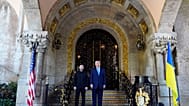The leader of Spanish band Angelslang, Sergio García Fernández, claims the Rolling Stones plagiarised two of his tracks to make 'Living in a Ghost Town', a song released during the pandemic. The case is now before a Madrid court.
The Rolling Stones are in trouble with Spanish group Angelslang. The band's frontman, Sergio García Fernández, has sued the veteran British rockers claiming they used two of his tracks to create their apocalyptic song 'Living in a Ghost Town', a single they released in 2020 during the COVID-19 pandemic.
Sergio García Fernández, an Argentinian musician based in Madrid, has filed the copyright infringement complaint in Madrid's 19th Commercial Court which alleges that Mick Jagger and Keith Richards used elements of two songs by Angelslang.
'Living in a Ghost Town', a reggae-influenced blues-rock track accompanied by a pandemic-inspired video, reached number three on the Hot Rock & Alternative Songs chart in May 2020.
At the time of its release, Stones frontman Mick Jagger said: "The Stones were recording new material in the studio before the quarantine and there was one song that we thought had a special resonance given the circumstances we're living in. We worked on it in isolation." And here it is, it's called 'Living in Ghost Town', I hope you like it".
"We recorded the song a year ago in Los Angeles for our new album, a project we're still working on, then the shit hit the fan and Mick and I decided that the song should be out now and here it is: 'Living in a Ghost Town'", added Keith Richards.
Plagiarism pursued in Spain after US court refusal
The case was originally filed in federal court in New Orleans when Sergio García Fernández's lawyer's pleaded: "The defendants never paid the plaintiff or obtained permission to use [the songs]."
However, the judge ruled that the Louisiana federal court lacked jurisdiction over Fernández's case. He noted that Jagger and Richards are British, Fernández lives in Spain and the Rolling Stones "have only performed in New Orleans four times".
Now, the lawsuit has been transferred to Madrid "following the express wish of their Satanic Majesties that the case be tried in Spain, as they alleged in their appeals to the New Orleans court, accepting in turn, the existence of similarities between the songs involved", the composer explained to the Spanish newspaper ABC.
Jagger's emails about Angelslang songs
Fernández maintains that they "misappropriated many of the recognisable and key protected elements" of his 2006 song 'So Sorry', as well as his 2007 track 'Seed of God'.
But how likely is it that the Stones were inspired by Angelslang's songs? Were they fans of the Spanish band? Fernández allegedly sent a CD demo of the tracks to Mick's brother Chris Jagger, whom he met at a gig in Madrid in 2013.
Later, Chris reportedly wrote him an email expressing that his songs and style were a sound that "The Rolling Stones would be interested in using", explains the plaintiff, who also has other emails in which Jagger and the Angelslang lyricist shared impressions of the song texts.
Have the Rolling Stones plagiarised or was Angelslang's style already based on that of the Brits?
The Stones, one of the world's most successful acts, have influenced countless musicians. But while it is true that the compositions of Fernández's band and 'Living in a Ghost Town' are similar, it is very difficult to discern which came first: perhaps the Spaniards were inspired by their Satanic Majesties or vice-versa.
Fernández claims that there are a multitude of coincidences between his compositions and 'Living in a Ghost Town', mentioning similarities in vocal melody, chord progressions, percussion patterns, harmonica parts, tempo, etc. The Argentinean composer's defence has provided an expert report by a musicologist which, according to them, shows that there has been "fragmented plagiarism", that is, the copying of recognisable parts of Angelslang's song.
Fernández suggests that "perhaps the Stones merged the two songs with AI, produced a hybrid and played over it". A theory that seems to lack a strong basis, because although artificial intelligence existed in 2020, it was not as advanced as it is today and its use was experimental.
The musician also claims to now have health problems after being hacked and harassed through social media networks. In response, Fernández adds that he has prepared a last will and testament in case something should happen to him during the process.



















